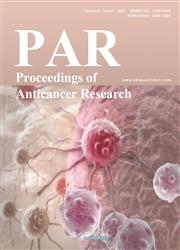The Effect of TSH Suppression Therapy on the Efficacy and Immune Function of Postoperative Patients with Thyroid Cancer
引用次数: 0
Abstract
Objective: To investigate the efficacy and immune function of thyroid stimulating hormone (TSH) suppression therapy in postoperative thyroid cancer patients. Methods: Sixty thyroid cancer patients admitted from July 2020–July 2022 were recruited and randomly divided into two groups. The control group (30 patients) received hormone replacement therapy, while the study group (30 patients) received TSH suppression therapy. The thyroid function, clinical efficacy, immune function, and tumor markers of the two groups were compared. Results: After treatment, the levels of free triiodothyronine (FT3) and thyroxine (FT4) in both groups increased significantly, while TSH levels decreased significantly. Moreover, the magnitude of change in the study group was greater than that in the control group (P < 0.05). The total effective rate in the study group was significantly higher as compared to the control group (P < 0.05). After treatment, the levels of CD3+ and CD4+ cells in both groups of patients increased significantly, with the study group showing significantly higher levels than the control group, whereas the level of CD8+ cells decreased significantly, with the study group having lower levels than the control group (P < 0.05). After treatment, the levels of Tg and CEA in both groups were significantly lowered as compared to before treatment, and the levels of Tg and CEA in the study group were significantly lower than the control group (P < 0.05). Conclusion: TSH suppression therapy in postoperative thyroid cancer patients can improve thyroid function, suppress the levels of tumor markers, and enhance immune function, thereby achieving good clinical outcomes.TSH抑制治疗对甲状腺癌症术后疗效及免疫功能的影响
目的:探讨甲状腺刺激激素(TSH)抑制治疗甲状腺癌症术后患者的疗效及免疫功能。方法:招募2020年7月至2022年7月收治的60例甲状腺癌症患者,随机分为两组。对照组(30例)接受激素替代治疗,而研究组(30名)接受TSH抑制治疗。比较两组患者的甲状腺功能、临床疗效、免疫功能和肿瘤标志物。结果:两组患者治疗后游离三碘甲状腺原氨酸(FT3)和甲状腺素(FT4)水平均明显升高,TSH水平明显下降。此外,研究组的变化幅度大于对照组(P<0.05)。研究组的总有效率明显高于对照组(P<0.01)。治疗后,两组患者的CD3+和CD4+细胞水平均显著升高,研究组的CD8+细胞水平明显下降,研究组的水平低于对照组(P<0.05)。治疗后,两组的Tg和CEA水平均比治疗前显著下降,结论:甲状腺癌症术后TSH抑制治疗可改善甲状腺功能,抑制肿瘤标志物水平,增强免疫功能,取得良好的临床效果。
本文章由计算机程序翻译,如有差异,请以英文原文为准。
求助全文
约1分钟内获得全文
求助全文

 求助内容:
求助内容: 应助结果提醒方式:
应助结果提醒方式:


